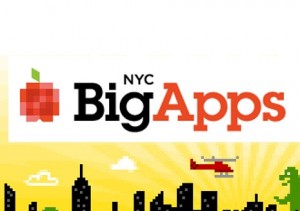
Such is the reason behind the existence of the annual NYC BigApps 3.0 competition, which challenges developers to create and develop useful online and mobile applications using City data. From finding the best restaurant to the nearest parking spot, from searching for the best school for your children to the subway schedule, web apps have been very helpful to every New Yorker who has access to the web.
After about a hundred competitors presented their projects, one rose to the top of the heap: NYC Facets. The men behind the winning app: Filipino-American developer Joel Natividad and his partner Sami Baig.
“NYCFacets is a labor of love that Sami and I put together over the past three months when we decided to jump into the entrepreneurial waters with both feet,” Joel Natividad, a 20-year IT veteran said. “We tried doing something on the side before, but as we quickly found out, it’s either you focus on it completely or don’t bother doing it at all.”
Natividad and Baig won the Best Overall Application grand prize of the competition, something they didn’t quite expect as they faced tough opponents. NYCFacets garnered top scores from a judging panel that included a number of luminaries in the fields of technology, venture capital, and City government.
The winning app sought to streamline and simplify the process for accessing, understanding, and utilizing the tremendous amount of data available in the City’s NYC Open Data portal.
“New York City is home to the most creative people, the most talented engineers, and the fastest growing technology community,” said Mayor Michael Bloomberg during the awarding ceremony last April. “Thanks to our Administration’s work on initiatives like BigApps, our technology incubators, and the new Cornell NYCTech campus on Roosevelt Island, we’re making sure New York City has a bright future as a tech capital.”
Natividad joined forces with Baig, a former colleague, to join the competition. Their first plan was to build NYCpedia, a Wikipedia-like app for all the datasets available from the city. They shifted gears when they realized they would not be able to meet the deadline and went back to the drawing board.
Then the questions began coming, and from these questions came the idea.
In essence, NYCFacets asked different questions – How do you make sense of the tremendous amount of data that NYC has? How do you separate the necessary from the unnecessary information? How do you make it available not only to developers but to businesses, city visitors and citizens alike?
NYCFacets, a project of Natividad and Baig’s Ontodia (a semantic tech startup), aims to create an Open City Metadata Exchange using open standards – creating a hyperlocal “River of Data”, whereby data innovators can build interchangeable solutions using their preferred technology stack while minimizing data balkanization or fragmentation.
In simpler terms, NYCFacets catalogs all New York City (NYC)-related datasources. Unlike a traditional data exchange, it not only catalogs metadata, it also extracts extrametada – additional metadata derived using semantics, statistics, algorithm & feedback from the crowd.
“With our “crowdknowing” approach, we aim to create an open-data mash-up portal on steroids that can collaborate structured and unstructured information,” Natividad said.
Just exactly what is crowdknowing?
“It is human-powered, machine-accelerated, collective knowledge systems cataloguing metadata and derived extrametadata,” Natividad explained.
Through NYCFacets, the problem on information overload will be addressed as the app hopes to help end users to navigate all the open data that NYC has.
Natividad likened it with the current batch of apps, like Yelp and Foursquare.
Through “crowdknowing,” experts on particular neighborhoods are identified, which gives their recommendations more weight than an ordinary person’s take on say, a specific restaurant in the East Village.
Initially, NYCFacets is targeting developers who are trying to use the NYC Open Data Catalog, researchers, journalists and the general public. It was created in response to NYC’s ambitious, multi-year roadmap to become the premier Digital City of the Future. A critical part of this roadmap calls for exposing as much City Data as possible through an API so that businesses and entrepreneurs can build innovative Smart City solutions.
With the recent passage of NYC’s Open Data Bill – a landmark and historic legislation mandating that all City Data be published in an Open Data portal, it has become apparent that navigating this rich datasource required a robust Discovery, Query Federation, and Semantic Integration mechanism. NYCFacets fills this need for the developer community.
“With the passage of the Open Data Bill, there will be a tsunami of data. It is up to the developers to come up with something that will decide which information is important and which data is not necessary,” Natividad said.
Natividad has been involved in a multitude of projects, in a broad range of industries that includes bioinformatics, life sciences, financial services, knowledge management and research. Prior to being the CEO of Ontodia, he was the headof Knowledge Engineering for TCG Software, where he also held the position of Director of Emerging Technologies. He pioneered several innovations in such diverse disciplines as federated search, real-time multivariate analysis, process & analytical technology, social geo tagging and document management and established TCG’s KE practice in 2008 with the focus of bringing semantics into the enterprise. The practice continues to grow, having successfully implemented a variety of semantic technologies at several key corporate clients.
Last year, while still at TCG Software Services, Natividad was part of a team that won the Large Organization Recognition Award at BigApps 2.0 – the city-sponsored contest for developers to use NYC Open Data – for participating in creating NYC Data Web, which integrates the NYC.gov data sets into a single web of data for developers.
For now, Natividad, who received his bachelor’s degree in Computer Science from De La Salle University in Manila, is just hopeful that they will be able “to do the same thing for New York City data that Bloomberg did for finance data.”
Winning Big Apps 3.0 is a giant step towards that direction.